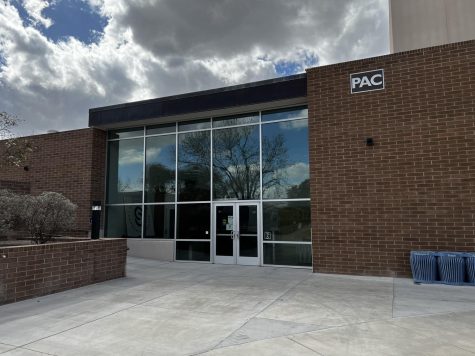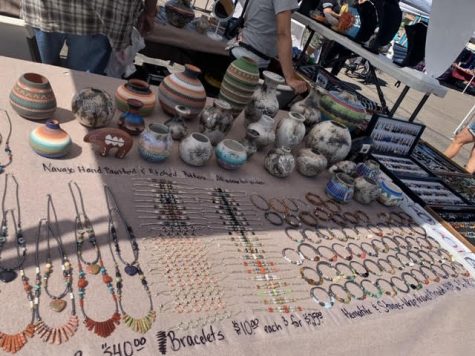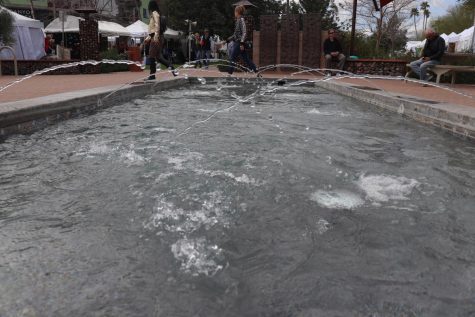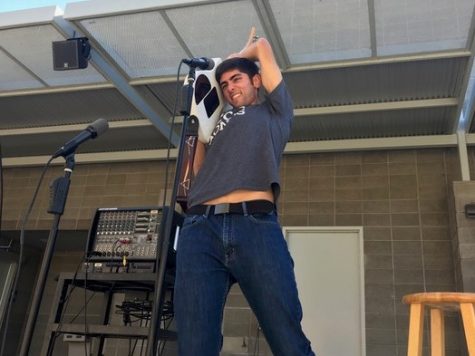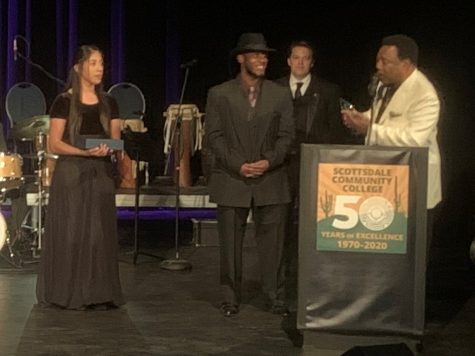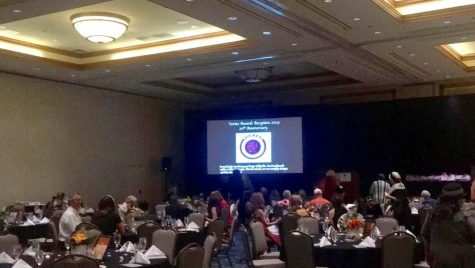National Geographic Live presents ‘Chasing Rivers’
Award-winning photographer Peter McBride presented a visually stunning review of two threatened rivers
April 10, 2015
On Mar. 25, National Geographic Live gave its final presentation of the season at the Mesa Arts Center, ‘Chasing Rivers.’ Peter McBride, a contributing writer, videographer and photographer for National Geographic, gave a thought-provoking presentation about the need to preserve our dwindling fresh water supply.
“It’s a very cutaneous program about current issues that people aren’t’t really talking about yet,” National Geographic Society Project Manager Samantha Zuhlke said.
Through McBride’s diligence and genuine passion for conservation, he created a visually stunning series of photography and film footage in order to speak to people and raises awareness.
“I think our programs act as catalysts for whatever lights you on fire when you’re listening to it,” Zuhlke said. “As long as you act on it in whatever way feels right, then that’s good.”
McBride came from humble beginnings. He grew up in Colorado and worked as a writer for a newspaper fresh out of college. However, it wasn’t until his expedition to Africa, where he assisted in reenacting the first air passage of 1920, that he earned national recognition for his talents.
“I risked everything, basically,” McBride said. “I maxed out two credit cards so I could go to Africa to be on the trip and help fundraise it.”
He has since then worked on assignments in over 70 countries for publications such as National Geographic and Outside Magazine. He has also created the award-winning film, “Chasing Water.”
“Chasing Rivers” began as a curiosity.
“I grew up on farm land chasing irrigation water. I wondered how long the water would take to get back to our creeks, and ultimately the Colorado River, so I decided to follow the river,” McBride said.
The presentation covered a unique capture of two of the most highly depended on, but threatened rivers: The mighty Colorado, which supports two countries and 36 million people, but is threatened by the south-west’s over consumption for agricultural and urban demands, and the Ganges, a river in India that is dying from pollution caused by the 500 million people it supports.
“We have so many people telling us what we should do, where we should get money and how we should live our lives, that it’s sometimes more powerful to just say here’s a story and here’s what happens. If you’ve done your job right, the pictures will do the heavy lifting,” McBride said.
Through his journey of discovery on the Colorado, McBride captured awe-inspiring aerial photography paired with footage he took while kayaking and hiking the lengths of the river.
He began at the river’s source, in Colorado, where the fresh rapids he grew up surfing are fed from the Rocky Mountains. He followed it down to the muddy waters in Sonora, Arizona and ultimately to its dry, desolate end in Mexico, where it was once a lush delta that supported an ecosystem of flora, wildlife and people.
He found his answer: the Colorado River no longer feeds the sea.
“This is what happens when we ask too much of a limited resource,” McBride said.
McBride’s engaging and eye-opening presentation perfectly illustrated the fragile state of the rivers we often take for granted, inspiring his audience to become conscious of their water consumption.
“I was shocked to learn that the average Phoenix resident uses 165 gallons of water per day and that Lake Powell is being drained so quickly,” audience member Marion Morgan said. “I had no idea it was so high. It was an eye-opener.”
Many of the drought-stricken southwestern states have already made critical changes in effort to preserve their water supply. McBride uses the example of Nevada, who has begun paying residents to rip up their lawns and replace them with artificial turf or plants that require less water. Nevertheless, there are still too many ‘straws in the cup.’
“We’re all users in this game and we need to figure out ways to do it better,” McBride said.
McBride ended his presentation with the acknowledgment of National Geographic’s membership with a campaign called ‘Change the Course.’ The text campaign allows people to support and contribute to McBride’s cause by to texting ‘water’ to 7177, and in doing so, pledging to care about the river. The corporation pledges to return 1,000 gallons to the river with every text.





